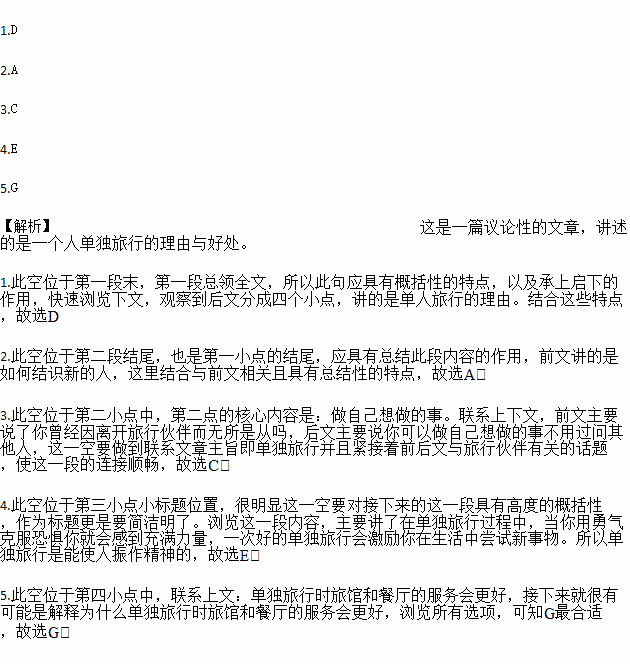题目内容
While it’s wonderful to share a special trip with friends or family, traveling alone is another experience. 1.
1. Meet new people.
People who are traveling alone seem more approachable to others. Before you know it, you could be chatting with some interesting folks at a sidewalk cafe or even joining a group of like-minded people on the beach. 2.
2.Do everything you want and nothing you don’t want.
Have you ever been hesitant to do that half-day at the spa you are eager for because you feel bad leaving your travel partner with nothing to do? 3. If you want to “waste” the day sitting at an outdoor bar drinking a cocktail instead of sightseeing, you won’t have to answer anyone.
34.
If traveling makes you a good, smart person, then traveling alone makes you better and smarter. Taking a trip by yourself might seem frightening. However, once you take the courage and get over your fears, you’ll feel a sense of energy. A successful single vacation can inspire you to try new things in life.
Great service.
For some reason, service at hotels and restaurants seems better when you’re traveling alone. 5. And it’s possible that when you make it known, you could be offered a better room or a free cocktail.
A.The key is to keep an open mind and keep safety in mind.
B.Travelling alone makes you truly listen to your inner thoughts.
C.When you travel alone, you don’t need to please anyone but yourself.
D.Here are four good reasons why you should try it.
E.It is refreshing.
F.Cheering up.
G.People tend to admire those who travel alone.
We all know that some things are obviously right.For example,it is right to be (1)kind to other people.It is also right to look after the environment.Some things are (2)eleralywrong,too.For instance,we should not hurt or bully(欺负) others,nor should we litter.Rules often tell us what is right or wrong..
Rules can help the public make the right (3)choices,and remain safe.Car drivers have to obey traffic regulations that tell them the right things to do on the road to avoid crashes.Cyclists who give signals before turning or stopping help prevent (4)accidents.
If people follow rules without taking other matters into consideration,it will be (5)easy for them to form what is sometiomes called a"black and white"view.For example,they may believe that people should always tell the truth,and that lying is (6)never acceptable.Such people always stickt to their views,even if it means that they may get into (7)trouble.
Sometimes it may not be so easy to know (8)exactly what is right or wrong.Some people choose not to eat meat because they believe that it is (9)cruel to eat animals,but others argue that they can eat meat and (10)still be kind to animals; some insist that stealing is always wrong,but others think that one does not need to feel to (11)guilty when stealing some food to eat,if lives in a really poor area and he is (12)staving.Rules help us live together in harmony,because they show us the right way to (13)treat other.However,some people argue that rules may be (14)confusing,having observed that rules change all the time,and that some schools have some regulations and other have different ones----so who is to (15)decide what is right?
| 1.A.kind | B.sensitive | C.fair | D.generous |
| 2.A.equally | B.slightly | C.eleraly | D.increasingly |
| 3.A.suggestiong | B.conclusions | C.turns | D.choices |
| 4.A.accidents | B.mistakes | C.falls | D.deaths |
| 5.A.interesting | B.vital | C.easy | D.valuable |
| 6.A.seldom | B.rarely | C.merely | D.never |
| 7.A.trouble | B.power | C.prison | D.control |
| 8.A.roughly | B.eventually | C.deliberately | D.exactly |
| 9.A.awful | B.cruel | C.unheatlthy | D.unnecessayr |
| 10.A.still | B.even | C.later | D.somehow |
| 11.A.nervous | B.anxious | C.afraid | D.guilty |
| 12.A.begging | B.staving | C.growing | D.wandering |
| 13.A.follow | B.instrude | C.treat | D.protect |
| 14.A.disgusting | B.confusing | C.unsafe | D.unimportant |
| 15.A.predict | B.explan | C.decide | D.consider |
| A. | can | B. | must | C. | may | D. | should |
| A. | who | B. | whose | C. | whom | D. | which |
-________.Will pennies do?( )
| A. | I know | B. | Never mind | C. | I am sure | D. | Let me see |

